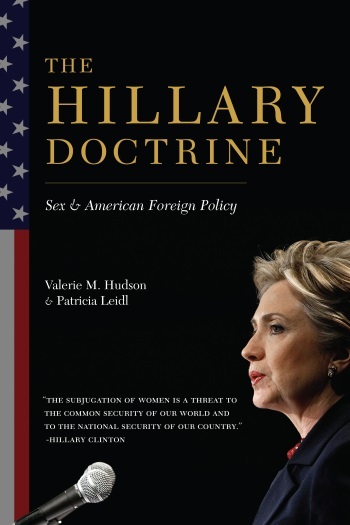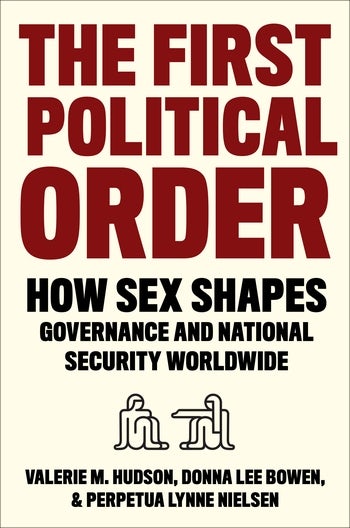No Matter Who’s Elected, We Need the Hillary Doctrine
“If Realpolitik implies being “realistic” about the world in which we live, then the Hillary Doctrine is potentially one of most transformative policy changes this nation has ever seen, capable of rendering our foreign policy far more effective than it has been to date.” — Valerie M. Hudson and Patricia Leidl
This week our featured book is The Hillary Doctrine: Sex and American Foreign Policy, by Valerie M. Hudson and Patricia Leidl, with a foreword by Swanee Hunt. Today, we have an article by Hudson and Leidl arguing that regardless of who wins the 2016 presidential election, U.S. policymakers should take the Hillary Doctrine seriously.
Don’t forget to enter our book giveaway for a chance to win a free copy of The Hillary Doctrine!
No Matter Who’s Elected, We Need the Hillary Doctrine
By Valerie M. Hudson and Patricia Leidl
President Barack Obama must be feeling a sense of relief: after being stymied by Congress at every turn, he can now exit the presidency with two major political triumphs to his credit courtesy of the Supreme Court—Obamacare and the legalization of gay marriage.
For even as the champagne bottles pop and long-time same-sex companions rush to tie the knot, the female half of the human population has a good reason to be less than sanguine about the Obama administration’s performance. Although the outgoing president can be credited with a number of high-level female appointments—Janet Yellen and Sonia Sotomayor to name but two—and has fought for the Paycheck Fairness Act and signed the Lily Ledbetter Act, there is one area where his administration has notably lagged: women and foreign policy.
Far from taking a strong stand to affirm the UN resolution 1325 on Women, Peace and Security, the administration has been worse than anemic with regard to ensuring that women in Afghanistan, Yemen, South Sudan and other fragile states take part in negotiations where their participation could mean the difference between war and peace, poverty and prosperity.
And while Obama was quick to condemn Russian Federation President Vladimir Putin on his stance on gay rights, he was completely mute on Putin’s tolerance of open, coerced polygyny and harshly enforced female dress code in Chechnya. So why the disconnect? Are not the rights of one half the population as worth fighting for as those of same-sex couples?
Moreover, the necessity of protecting the rights of women is far from simply a ‘moral argument,’ as some suggest.
As presidential contender Hillary Clinton so succinctly declared during her four-year tenure as Secretary of State, “the subjugation of women is a threat to the common security of our world and to the national security of our country.” Now known as “The Hillary Doctrine”, this explicit articulation of the connection between the status of women and the security of states became a central platform of Clinton during her four-year stint as Secretary of State and will likely be again if she manages to ascend to the highest political office in the land.
Okay, one might ask, how can the oppression of one half of the world’s population possibly threaten the US or its allies? Well, it works like this. There is now copious empirical evidence that the security of women and the security of the states in which they live are closely linked—and this also applies to the US.
For example, using the largest extant database on the status of women in the world today, Texas A&M University Professor Valerie M. Hudson and her colleagues found that the very best predictor of a state’s peacefulness is not its level of wealth, its level of democracy, or its ethno-religious identity: the best predictor of a state’s peacefulness is the status and security of its women.
These findings echo those of other scholars, who have discovered that the greater the chasm that yawns between the male haves and the female have-nots in a given society, the more likely a country is to be involved in intra- and interstate conflict, and to be the first to resort to force in such conflicts. Other findings support the notion that the status of women directly affects the security, stability, prosperity, bellicosity, corruption, health, regime type, and (yes) the power of the state.
As former USAID deputy administrator Donald Steinberg bluntly put it, “Compare those societies that respect women and those who don’t. Who’s trafficking in weapons, drugs? Who’s harboring terrorists and starting pandemics? Whose problems require US troops on the ground? There’s a one-to-one correspondence. Don’t tell me there’s no relationship between national security and the empowerment of women.”
If Clinton is elected, one of the guiding principles of American foreign policy will be the Hillary Doctrine. As Secretary of State, Clinton revolutionized the institutional framework under which US foreign policy is conducted, from developing the first US National Action Plan on Women, Peace, and Security to mandating that all incoming foreign service officers receive training in gender analysis.
Furthermore, under Clinton, every bureau, embassy, and office of the State Department and USAID was required to undertake a gender analysis of its areas of responsibility, ensuring that the concerns of women were mainstreamed into the work of US diplomacy and development.
Unfortunately, President Obama and his closest advisors, including Clinton’s successor John Kerry, have shown little interest in implementing the Hillary Doctrine. They have dropped the subject of Afghan—or Iraqi or Syrian or Libyan—women like so many “pet rocks” weighing down their rucksack.
This is a critical issue that voters would be well advised to keep their eye on even though it will likely fly under the media’s radar. So are any candidates besides Clinton talking about the global empowerment of women as an important national security issue? Not one. Not even one. Indeed, while researching the candidates, it struck us as ominous that in the 2013 vote to reauthorize the Violence Against Women Act, four of the twenty-two senators that voted nay—all male, by the way—were Ted Cruz, Lindsay Graham, Rand Paul, and Marco Rubio.
This view is woefully short-sighted. Indeed, we’d argue that no matter who is elected in 2016, one thing is clear: US foreign policy would be well served by retaining the Hillary Doctrine.
If Realpolitik implies being “realistic” about the world in which we live, then the Hillary Doctrine as potentially one of most transformative policy changes this nation has ever seen, capable of rendering our foreign policy far more effective than it has been to date.
So keep your eye on this issue. If a candidate cannot articulate why women’s empowerment is critical to safeguarding national and international security, then that reveals something important about their foreign policy acumen. If a candidate has no women among their foreign policy advisors, that’s another red flag. And if the press is on its toes, this is one issue that should definitely be on the list of questions for the presidential campaign debates: “Do you believe the subjugation of women is a threat to national security? If not, why not; and if so, what do you intend to do about it?”
Effective foreign policy means understanding that the fate of nations is tied to the security and status of women. Note to the candidates: you don’t even have to call it the Hillary Doctrine—just call it common sense.








1 Response